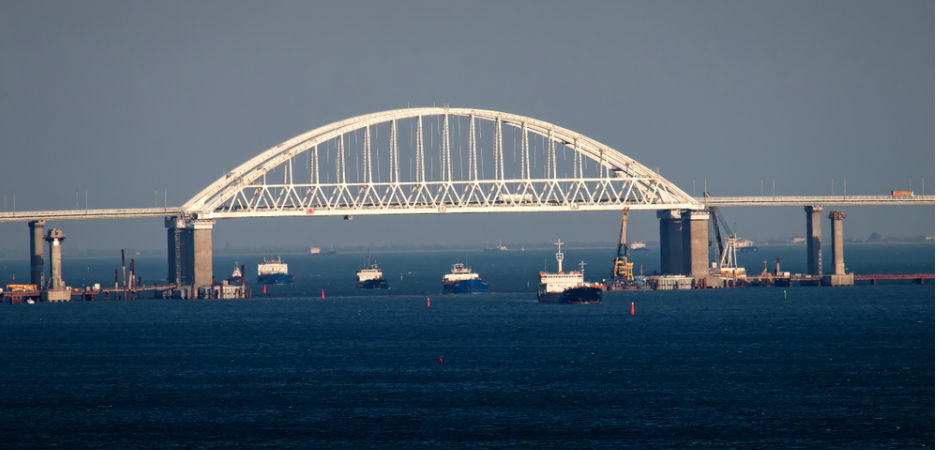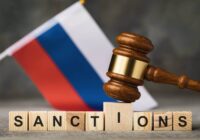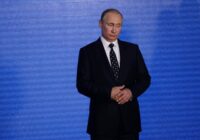Ukraine’s democratic progress is fragile, and there is a risk that domestic opposition could manifest itself in an ugly manner independently of Russia.
Russia’s November 26 attack on the Ukrainian navy in the Kerch Strait off the coast of Crimea, followed by Kyiv’s imposition of martial law the following day, have seen the conflict in Ukraine once again dominate the headlines around the world. Headed into its fifth year, the war in eastern Ukraine has taken some 11,000 lives, displaced millions and seen trench warfare return to Europe’s landscape. However, leading policymakers — both in Ukraine and in the wider West — appear trapped by inertia, offering policy proposals that are largely unrealistic or dangerously escalatory. Looking ahead at what the incident means for Ukraine makes it clear that the status quo is long overdue for a change.
Firstly, it must be noted that imposition of martial law, which comes into effect on 28 November, is unprecedented in Ukraine’s independent history. The Verkhovna Rada, Ukraine’s parliament, has voted to approve the measure for the country’s southern and eastern regions, as well as the province of Vinnytsia, the southern edge that borders the Moldovan breakaway region of Transnistria. The enclave is reliant on Russian military and economic support, as are the proxy regimes controlling half of Ukraine’s self-declared Donetsk and Luhansk provinces — its easternmost regions. The conflict in eastern Ukraine shows no signs of improvement, with frontline clashes continuing unabated even if no major escalation or changes in the lines of control has occurred since 2015.
No Sideshow
In declaring martial law, President Petro Poroshenko warned that Ukrainian intelligence had uncovered a Russian plot to launch a ground invasion and cited the threat posed by the large military presence the Kremlin has built up along Ukraine’s borders. Moscow has kept control of Crimea since annexing the peninsula in 2014, and so the Russian threat is palpable within Ukraine’s internationally recognized borders as well. Without access to the documents Poroshenko cited (they have not been released) it is impossible to tell how this threat may have changed in recent days.
In part for that reason, voices as influential as America’s former ambassador to Ukraine, John Herbst, have dismissed the introduction of martial law as a “sideshow.” This is misguided. The very nature of the West’s support for Ukraine comes less from realist considerations of power and geopolitics but primarily from the fact that the so-called Euromaidan revolution so clearly espoused the goal of turning Ukraine into a liberal democratic state. If the imposition of martial law threatens that development, this would be an unrestricted victory for the Kremlin, which wants nothing more than to discredit the Ukrainian revolution and its progressive aspirations.
In an attempt to assuage such concerns, the Verkhovna Rada implemented martial law only for 30 days rather than the initial recommendation of 60 days. It also passed a resolution guaranteeing the presidential election scheduled for March 2019 would go ahead as planned. While one must hope for the sake of Russia and Ukraine, as well as the world, that a full-scale invasion does not come to pass, there will remain a high risk that the Kremlin will seek to disrupt this vote, potentially through further provocations.
There are domestic challenges to the Ukrainian elections as well, of course. Oligarchic control of the economy and key political blocs remains a major challenge, and institutional reform is sorely lacking, even if there are some glimmers of progress. Further engagement is therefore necessary with Ukrainian civil society, which has been at the forefront of not only the Euromaidan movement, but has valuable experience with the country’s challenges no foreign government or activist group can replicate. For example, the nonprofit Fakes Radar, which serves to counter Russian disinformation, was founded by Dmytro Potekhin — the man who helped highlight the fraud in the 2004 presidential elections that preceded the Orange Revolution. Yet such activists lack even a semblance of political influence of the country’s oligarchs; outside support can help rebalance the scales.
The choice the Ukrainian people will make when it comes to the country’s next president must remain theirs and theirs alone. It is true that populist forces are on the rise, and the current frontrunner in the polls is a controversial former prime minister with a checkered track record, Yulia Tymoshenko. Yet Ukraine’s supporters must also recognize that Ukraine’s democratic progress is extremely fragile, and there is a risk that domestic opposition could manifest itself in an ugly manner independently of Russia. However, preparation for such eventualities and efforts to ensure vote buying and rigging do not plague the election is lacking.
Sending Signals
In place of such constructive efforts, one can find numerous calls for the West to take action to shore up support for Ukraine through clear military signaling. Atlantic Council senior fellow, Anders Åslund, one of the most prolific voices in the US on the Ukrainian conflict, called for NATO to send ships to the Azov Sea to guarantee it remains open to international shipping. Not only would such an effort be extremely escalatory, it is also highly unlikely to receive any support from Turkey — NATO’s most powerful navy in the region — given the deepening relationship between President Recep Tayyip Erdoǧan and Vladimir Putin.
That is not to say there are not steps Ukraine’s allies can take to support it. Intervention in Russia and Ukraine’s economic conflict on Kyiv’s side would be a strong first step. An immediate effort from the United States could be the resumption of the sovereign bond guarantee program effectively frozen by the Trump administration. The US offered such guarantees for $3 billion in Ukrainian debt between 2014 and 2017 and should do so again, as Russia’s actions in Ukraine’s financing costs spike again, restraining Kyiv’s access to international credit markets. The International Monetary Fund should also consider the political economy of its mandated economic reforms in Ukraine, where they are being seized upon by populist and even anti-democratic groups to galvanize opposition to the government and the ideals of the Euromaidan movement.
Which Ukrainian regions will be under the #MartialLaw from November 28? #Ukraine #AzovSea #KerchStrait pic.twitter.com/Ue6tbfdxNA
— Radio Free Europe/Radio Liberty (@RFERL) November 27, 2018
There are sure to be calls for further sanctions on Russia as well. Discussion of such measures is already under way over the March attack on Russian double agent Sergei Skripal and his daughter Yuliya in Britain. The US Congress is also debating further measures, although — at least before the Kerch incident — it had been expected that these would be delayed until at least January, when the new Congress is seated. Numerous sanctions regimes are nominally tied to Russia’s actions in Ukraine and, at least in theory, would be loosened or lifted entirely if Russia complies with the Minsk Protocol, despite the fact that this too would leave the Kremlin with a level of influence in Ukraine unacceptable to many of its citizens.
Deterrent
However, numerous escalations still have yet to be met with specific sanctions. For example, although Australia and the Netherlands announced in May that they were holding Russia legally responsible for shooting down Malaysian Airlines Flight 17 over eastern Ukraine in July 2014, no direct measures have been imposed. Ukraine also remains unable to deploy its own air force in its own skies to take on separatist proxies in Donetsk and Luhansk due to Russian threats to employ its anti-aircraft firepower in their defense.
Instead of debating sanctions every time Russia takes an escalatory step in Ukraine, or renewing them every six months as the European Union presently does, Ukraine’s allies must consider outlining sanctions that would automatically snap into effect in the event of various escalations. Strong arguments have been made that such sanctions have been effective, particularly regarding Russia’s economy, though there are valid counterarguments that they have failed to isolate Russia politically.
But if the goal is for sanctions to serve as a deterrent to further Russian hostilities, as State Department spokesperson, Heather Nauert, said, just this August, they should be, then it must be clear exactly what measures Russia will face if it does escalate. Given the middling state of the Russian economy and the growing sentiment among Russians that Putin is responsible for the country’s economic challenges, such an effort could prove effective in deterring any escalation in Ukraine.
It is a challenging and precarious time for Ukraine, especially for both foreign and domestic policymakers whose efforts have yet to help Ukraine meet the promises Euromaidan offered. The recent escalation and imposition of martial law only add to Kyiv’s myriad challenges and pose far-reaching threats. They must be met by developing sensible and employable policies that serve as a deterrent to further escalation and also help Ukraine’s civil society take the lead in developing, and protecting, the country’s future.
The views expressed in this article are the author’s own and do not necessarily reflect Fair Observer’s editorial policy.
Support Fair Observer
We rely on your support for our independence, diversity and quality.
For more than 10 years, Fair Observer has been free, fair and independent. No billionaire owns us, no advertisers control us. We are a reader-supported nonprofit. Unlike many other publications, we keep our content free for readers regardless of where they live or whether they can afford to pay. We have no paywalls and no ads.
In the post-truth era of fake news, echo chambers and filter bubbles, we publish a plurality of perspectives from around the world. Anyone can publish with us, but everyone goes through a rigorous editorial process. So, you get fact-checked, well-reasoned content instead of noise.
We publish 2,500+ voices from 90+ countries. We also conduct education and training programs
on subjects ranging from digital media and journalism to writing and critical thinking. This
doesn’t come cheap. Servers, editors, trainers and web developers cost
money.
Please consider supporting us on a regular basis as a recurring donor or a
sustaining member.
Will you support FO’s journalism?
We rely on your support for our independence, diversity and quality.






